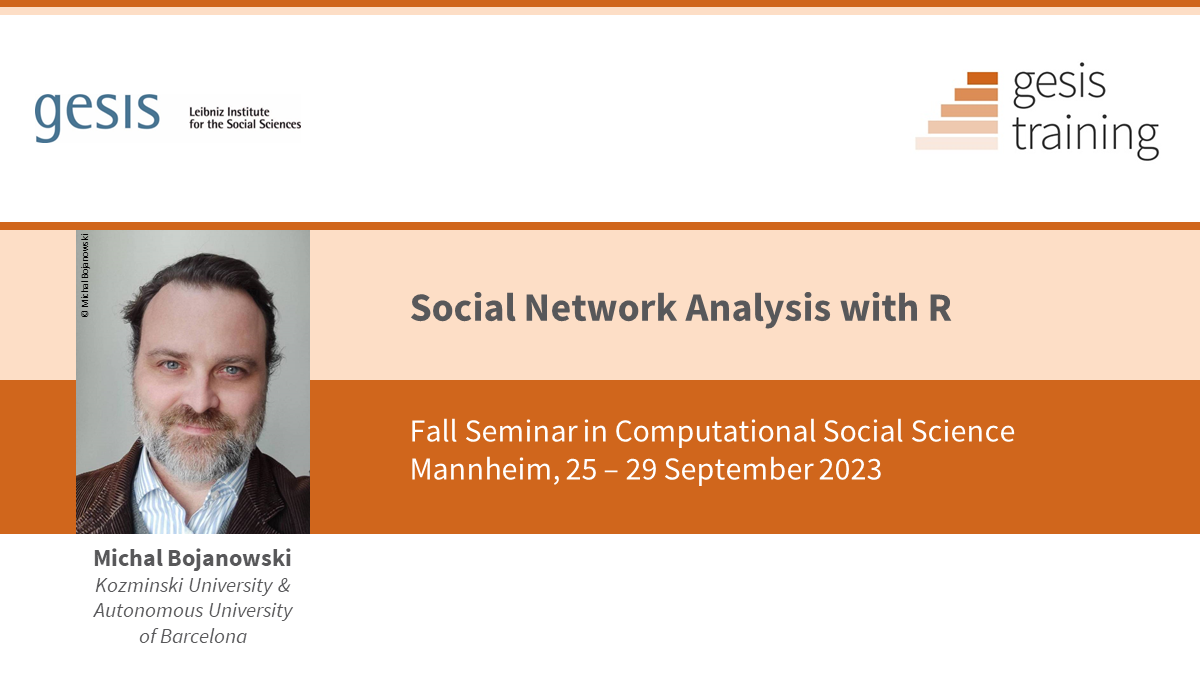
Hear, hear, hear!
In September GESIS - Leibniz Institute for the Social Sciences GESIS Training organizes its regular and reputable Fall Seminar in Computational Social Science. As a part of that event this year I will be offering an intensive 5-day in-person course on Social Network Analysis with R. The course is designed for researchers looking to extend their knowledge and skills in empirical research to network-related problems and analyzing network data, and to network researchers intending to learn doing Social Network Analysis in R. The program will cover typical stages of network analysis study, namely: importing network data, network data management and transformation, visualization, network structure descriptives (such as components, cliques, communities, homophily, segregation), and elements of statistical network analysis (such as hypothesis testing, ERGM, SAOM). The organization of the course facilitates gaining practical skills with morning sessions dedicated to lecture/demonstration and afternoon sessions dedicated to practical exercises and hands-on case studies. Participants are encouraged, but not required, to bring their own data.
Registrations are open! Details and links below.
🕰 When: September 25-29, 2023 🌍 Where: GESIS Mannheim, Germany 🔗 Details of the course: https://training.gesis.org/?site=pDetails&child=full&pID=0x4693CE99CF9F4C0FB26F47EA79E611BA&subID=0x0E15EE73F46043069631395E0C0190C2 🔗 Details of the GESIS Fall Seminar: https://www.gesis.org/en/gesis-training/what-we-offer/fall-seminar-in-computational-social-science
Archived version: https://www.gesis.org/en/gesis-training/courses-registration/archive/methods-seminar/2023
Workshop description
The course will provide a hands-on tour through the important concepts and methods of Social Network Analysis (SNA). The main goal is to put the participants on a well-lit road towards conducting a typical social-network-analytic project comfortably on their own using R. The focus is on the practical application of key ideas of SNA rather than discussing (social) theories standing behind them. Nonetheless, pointers to the relevant theoretical and applied literature will be provided.
To this end, the course will discuss importing network data from various formats, managing network data within R, basic SNA descriptives (including density, transitivity, homophily/segregation, and centrality), community detection, and creating effective network visualizations. The course will conclude with coverage of the basics of statistical modeling of networks with Exponential-family Random Graph Models (ERGM) and Stochastic Actor-Oriented Models (SAOM).
Course meetings will consist of two parts. The first part will consist of a presentation, demonstration, and discussions on various SNA concepts and methods. The second part will be focused on hands-on training in applying the presented concepts and tools using real data. While the instructors will provide datasets for these exercises, participants are encouraged to bring their own data.